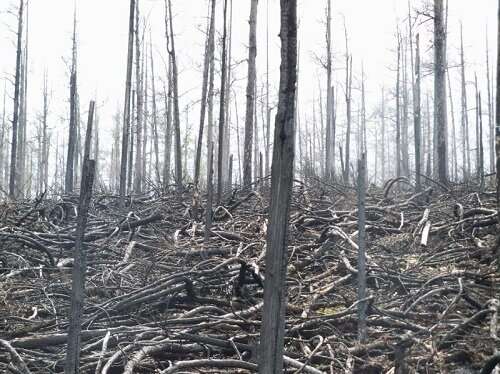Fire aerosols decrease global terrestrial ecosystem productivity through changing climate

Fire is the primary form of terrestrial ecosystem disturbance on a global scale, and a major source of aerosols from the terrestrial biosphere to the atmosphere.
Most previous studies have quantified the effect of fire aerosols on climate and atmospheric circulation, or on regional and site-scale terrestrial ecosystem productivity. So far, only one work has quantified the global impacts of fire aerosols on terrestrial ecosystem productivity. It was based on offline simulations driven by prescribed atmospheric forcing, so did not consider the fire aerosols' impacts through changing climate (e.g., cloud-aerosol interactions or climate feedbacks).
In a paper recently published in Atmospheric and Oceanic Science Letters, Dr. Fang Li from the Institute of Atmospheric Physics, Chinese Academy of Sciences, provided the first quantitative assessment of fire aerosols on global ecosystem productivity that takes into account the influence of aerosols' climatic effects. The study was based on fully coupled (atmosphere-land-ocean-sea-ice) simulations of the global Earth system model CESM1.2.
According to this study, fire aerosols generally decreased terrestrial gross primary productivity (GPP, carbon input of terrestrial ecosystem, the carbon uptake through photosynthesis) in vegetated areas, with a global total of -1.6 Pg C per year, mainly because fire aerosols cooled and dried the land surface and weakened the direct photosynthetically active radiation (PAR). Exceptions to this were the Amazon and some regions in North America, which was mainly due to a fire-aerosol-induced wetter land surface and increased diffuse PAR.
"Cooling, drying, and light attenuation are major impacts of fire aerosols on global terrestrial ecosystem productivity," concludes Dr. Li.
More information: Fang LI, Quantifying the impacts of fire aerosols on global terrestrial ecosystem productivity with the fully-coupled Earth system model CESM, Atmospheric and Oceanic Science Letters (2020). DOI: 10.1080/16742834.2020.1740580
Provided by Chinese Academy of Sciences




















